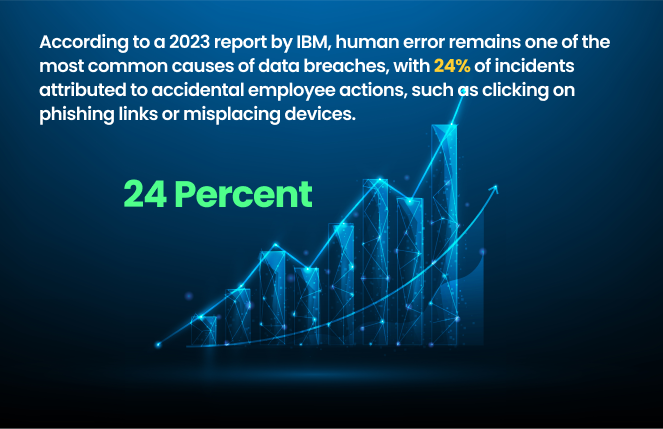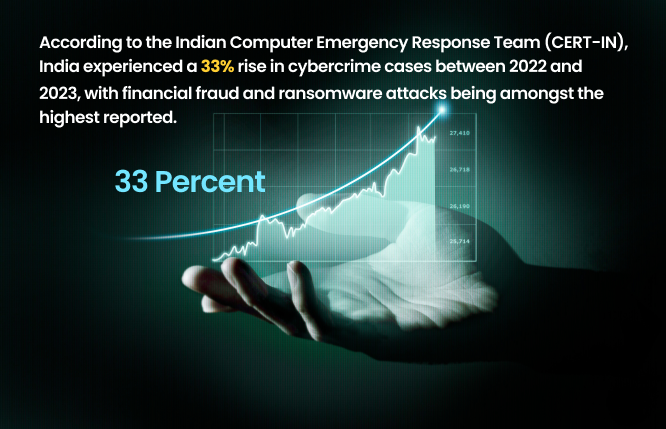Cyber attacks are now an unpreventable fact of life for businesses of any size in the contemporary digital world. Nonetheless, many still feel uncomfortable with this, often due to misinterpretations or cost fears. However, cyber risk is everywhere, and not even businesses are protected from the very damaging characteristics of a successful cyber attack.
Let’s dive into the most common objections to cyber insurance and debunk them with hard facts and relevant insights, including a focus on the growing cyber risks specific to businesses in India.
Objection 1: “We don’t need cyber insurance. We invest in IT security.”
Investing in IT security is critical. Firewalls, intrusion detection systems, and strong passwords can help reduce cyber risk. But while these security measures are necessary, they could be more foolproof. Cyberattacks are continuously changing, and even the most sophisticated security systems can be penetrated.

According to a 2023 report by IBM, human error remains one of the most common causes of data breaches, with 24% of incidents attributed to accidental employee actions, such as clicking on phishing links or misplacing devices. If any unintended mistake occurs, the top level of the IT platform will pose the highest degree of risk and be vulnerable to attacks.
Just like you wouldn’t rely on locks and alarms to protect your physical property, cyber insurance is a safety net if your security measures fail. In fact, according to Accenture’s 2023 Cybersecurity Report, over 40% of organizations experienced at least one cyberattack in the past year despite having robust IT security.
Key takeaway: Cyber insurance is not a replacement for IT security but an adjunct to it, providing another layer of protection.
Quick Read: The Role of Cyber Insurance in Business Continuity and Resiliency.
Objection 2: “Cyber attacks only affect big businesses. We’re too small to be a target.”
Small businesses are often seen as out of reach for cybercriminals. But the truth is that small—and medium-sized businesses (SMBs) are a popular and coveted soft target.
In India, SMEs account for over 95% of businesses, and many need to be equipped to reach full-scale cybersecurity measures. Of course, cybercriminals use this knowledge, so small businesses are vulnerable. As the 2023 Cybersecurity Ventures Report indicated, close to 43% of cyberattacks are aimed at small companies, and according to Verizon 2024 Data Breach Investigations Report, more than half of small businesses fail within six months after a cyberattack because of the financial and reputational impacts.
The key here is the cost of recovery. Small and medium enterprises (SMEs) often need to have enough funds to absorb the expenses related to ransomware attacks, legal fees, data restoration costs, etc. Cyber insurance protects small companies from financial damage and ensures access to technical and legal support, which is otherwise very challenging.
Key takeaway: Cyberattacks do not favor small or large businesses. Small businesses are vulnerable and need protection.
Objection 3: Since we do not collect sensitive information, we do not need cyber insurance.
There is a widespread misperception that cyber exposure applies only to companies processing private data like credit card data or health records. Every business in the digital world is susceptible to some form of cyber risk, regardless of whether it processes sensitive data.
Consider ransomware, one of the most severe cybercrimes. It can irrevocably destroy an enterprise regardless of the type of activity or robustness of data protection measures. As reported by Cybersecurity Insiders, 60 organizations affected by ransomware claimed that their data was not necessarily confidential.

Cyber fraud and money transfer or credit fraud are increasing rapidly in India. The target of cybercriminals consists of companies that exploit the infrastructures for payment and generate direct financial damage. According to the Indian Computer Emergency Response Team (CERT-IN), India experienced a 33% rise in cyber attacks between 2022 and 2023, with financial fraud and ransomware attacks being amongst the highest reported.
Cyber insurance can cover data breaches and losses due to operational disruptions caused by cyberattacks. Such attacks could harm your company’s reputation, lead supply chain operations to a standstill, and lead to severe costs to your profit.
Key takeaway: Cyber risks are not limited to confidential information; any company using computers is a potential victim.
Objection 4: Since everything is outsourced to IT, there is no need to worry.
Outsourcing IT services may be a solution to managing risk, but more is needed to relieve the business of responsibility. Outsourcing is transferring one aspect of your business to a third party, which inherently involves risk factors.
However, suppose the IT service provider that your IT service provider/consulting firm provides IT services is compromised. In that case, your business will not be off the hook for giving notice of any affected individuals and undertaking any reporting requirements under applicable law and regulation.
In India, because data protection law has strengthened in light of the Personal Data Protection Bill (PDPB), companies may face serious consequences, including heavy penalties, for not safeguarding customer information.
Additionally, a third-party breach can cause operational disruptions. For example, your providers’ or your systems’ failure may cease customer service, leading to revenue loss and damage to your reputation. Cyber insurance can secure reimbursable coverage for these third-party incidents, such as business interruption loss, legal loss, etc.
Key takeaway: Outsourcing IT does not eliminate your risk; rather, it offloads the burden of managing it onto an external party.
Objection 5: “It’s too expensive.”
Cost is not infrequently cited as one of the main factors that causes a business to pause when considering cyber insurance. However, when you account for a cyberattack’s actual cost risks, the insurance price premium is low.
Globally, the average data breach cost in 2023 was $4.45 million (IBM), which has continued to rise yearly. This type of cost is devastating for small and medium-sized firms. Cyber insurance is positioned to help offset those costs by reimbursing ransom, legal, regulatory, and recovery costs.
In India, with a business expenditure of $13 billion per annum by 2025 covered by cybercrime, ransomware is one of the main threats. Cyber insurance will be challenging, if not impossible, for many firms to bounce back from losses in financial damage due to a cyber attack.
Key takeaway: Cyber insurance is an investment in your business’s future stability, providing access to critical resources during a cyber crisis.
The Mitigata Advantage: Navigating Cyber Risk with Confidence
Because cyber threats are constantly evolving, safeguarding your business is paramount. Cyber insurance is not just a babysitter but an essential part of your risk management program.
Mitigata provides not simply security but a partner dedicated to helping your business cope with the challenges of cyber risk. Mitigata provides customized cyber insurance policies that combine active risk management, cybersecurity expert access, and financial cover to support prompt recovery following a breach.
Whether you’re a small startup or a larger organization, Mitigata ensures you can handle cyber risks confidently. If cyberattacks are too predictable, don’t wait for the worst to happen.
Call Mitigata and secure the cyber insurance protection your business deserves for tomorrow.




